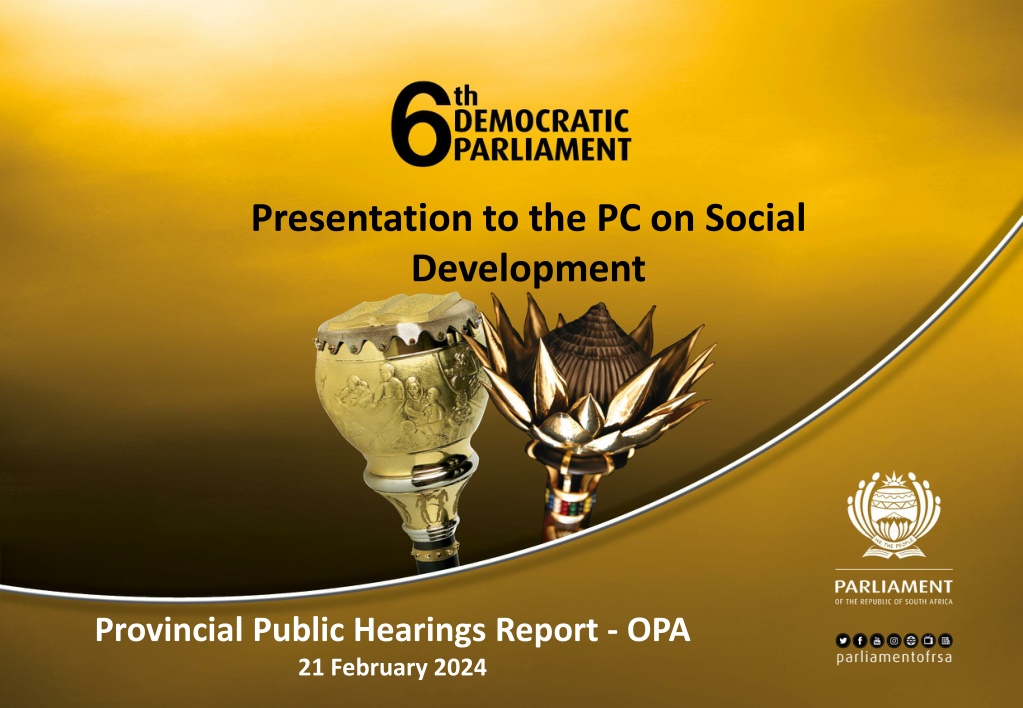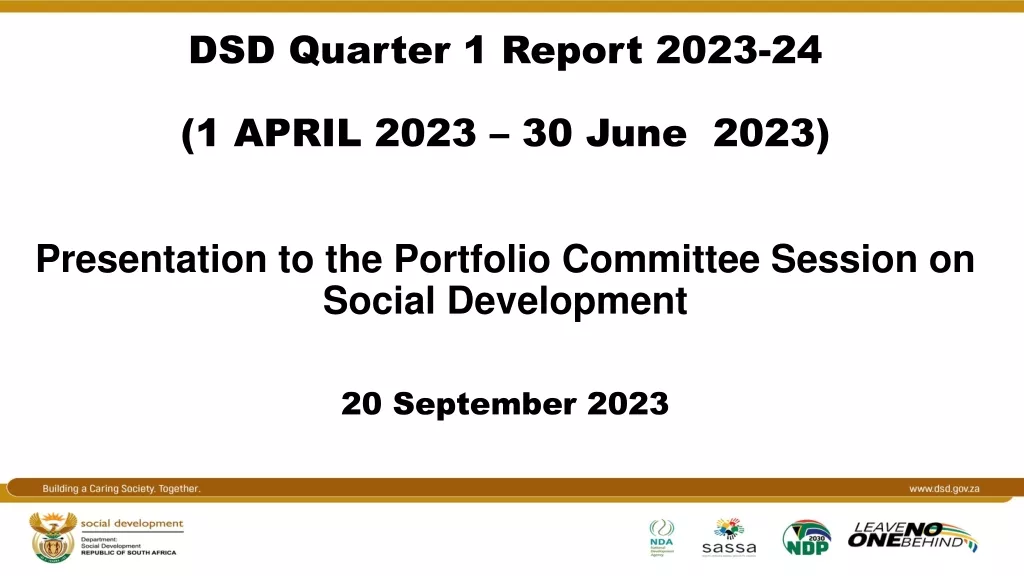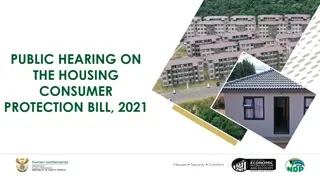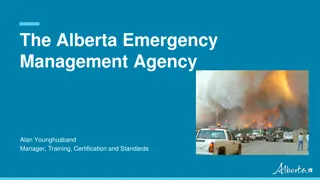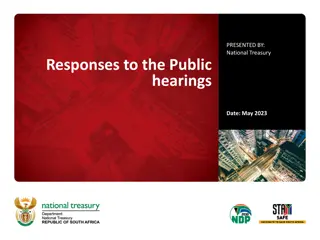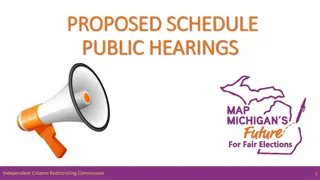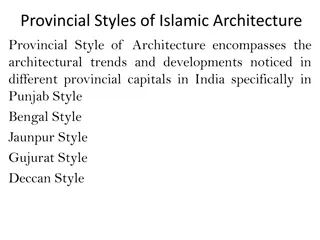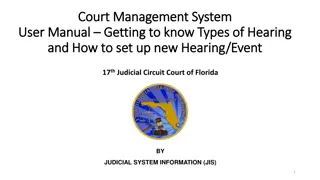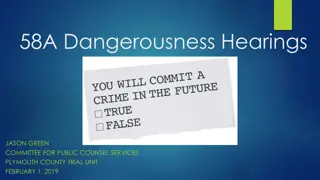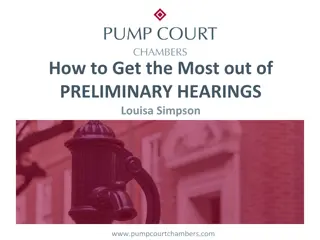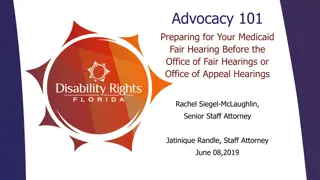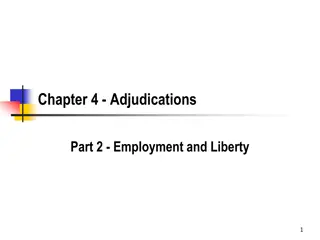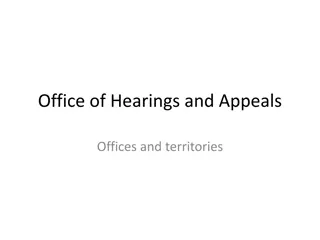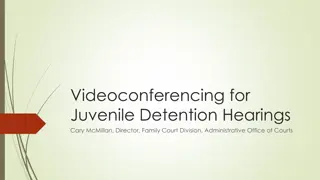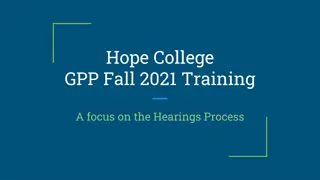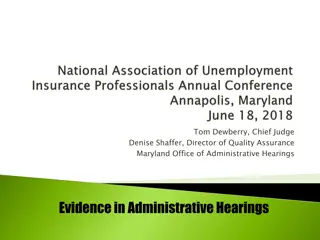Social Development Provincial Public Hearings Report - OPA 21 February 2024
The presentation to the PC on Social Development highlights the importance of public involvement in legislative processes. The report covers statistical analysis, attendees, speakers per province, gender distribution, comments, recommendations, and proposals related to the Bill focusing on uplifting older persons. Key points include neglect of older persons, youth empowerment misconceptions, and the need for widespread education on the Bill post-implementation.
Download Presentation

Please find below an Image/Link to download the presentation.
The content on the website is provided AS IS for your information and personal use only. It may not be sold, licensed, or shared on other websites without obtaining consent from the author. Download presentation by click this link. If you encounter any issues during the download, it is possible that the publisher has removed the file from their server.
E N D
Presentation Transcript
Presentation to the PC on Social Development Provincial Public Hearings Report - OPA 21 February 2024
Table of Contents Background Statistical analysis Comments, recommendations and proposals per clauses Service delivery issues raised not related to the Bill Comments on the public hearings 2
Background Public hearings were conducted from 02 June 26 November 2023 in all nine provinces. Constitution in Section 59(1)(a) and Section 72 (1)(a) National Assembly and National Council of Provinces must facilitate public involvement in the legislative and other processes of their committees. 3
Statistical analysis Number of attendees and speakers per province 1400 1297 1200 1000 912 854 800 748 721 721 556 600 545 526 400 200 104 81 79 79 66 57 54 54 32 0 Limpopo Eastern Cape KwaZulu-Natal Mpumalanga Gauteng Northern Cape Free State Western Cape North West Attendees Speakers 4
Cont. Statistical analysis Number of speakers by gender per province 90 77 80 70 58 57 60 48 50 43 42 39 38 40 27 30 22 21 21 18 18 17 20 15 15 14 10 0 Limpopo Eastern Cape KwaZulu-Natal Mpumalanga Gauteng Northern Cape Free State Western Cape North West Females Males 5
Comments, recommendations and proposal per clauses Nature of the Bill- the Bill was supported because its amendments show older persons have been neglected for a long time. Focus has always been on youth empowerment and that has given the youth misconceived power to abuse older persons. The Bill gives older persons the right to speak for themselves. It also uplifts and gives older persons dignity. 7
Comments, recommendations and proposals per clauses Nature of the Bill The Bill was supported because its amendments show older persons have been neglected for a long time. Focus has always been on youth empowerment and that has given the youth misconceived power to abuse older persons. The Bill gives older persons the right to speak for themselves. It also uplifts and gives older persons dignity. Recommendation: There should be a widespread education, across all levels of government, on the Bill once it has been passed into law. 8
Cont. Comments Clause 1: Definitions Most speakers supported the substitution for the definition of olderperson in the principal act, which the Bill proposes that olderperson means a person who is 60 years of age or older. The amendment was supported because it will do away with discrimination against men regarding access to government benefits such as Old Age Pension. The amendment thus ensures equal rights for both women and men. 9
Cont. Comments Unequal ages used to create conflicts (GBV) in the families, and it was uncultured as it is commonly known that male persons should provide for their families. The amendment will bring back male dignity in their families. 10
Cont. Comments Clause 3 The amendment of section 3(b) of the Bill was widely supported by the speakers as it recognises stakeholders in the provision of services for older persons. However, it is proposed that the Bill should clearly outline the responsibilities of all the stakeholders in order to ensure adequate services for older persons. Across of all provinces speakers raised concerned about the poor service they receive at health care facilities (local clinics), police stations, banks, and municipalities. They stand in long queues with no shelter, chairs, access to water and ablution facilities. Health care facilities often have shortage of medication. Police officials do not investigate reported cases of elder abuse. Municipal bills are not affordable to older persons. 11
Cont. Comments Elder government government that seem to operate as separate entities such as the Master s Office. It falls under the Department of Justice and Constitutional Development. Recommendation: the Bill should make it compulsory for all public and private service facilities should have separate/dedicated queues specifically dedicated for older persons. care involves departments responsibilities and of various institutions of 12
Cont. Comments Clauses 4 and 5 The insertion of clauses 4 and 5 of the Bill was welcomed as it mandates all organs of the state and all officials to respect, protect and promote the rights of older persons. Most speakers proposed that the Bill should explicitly include the roles of the departments such as health, human settlements, and local government in bringing services to old age service centres. Also, the inclusion of youth as ambassadors of older persons rights was highly recommended. 13
Cont. Comments Only DSD visits older persons service centres to conduct monitoring and provide services. Department of Health is not visible, hence there is a shortage of health care services. Some residential facilities take a large portion from old age grant of the residents. Some residents are only R200 left from their grants. This leaves older persons with no money to buy their personal items such as snacks, toiletries, etc. 14
Cont. Comments Recommendations: traditional leaders, councillors, and the youth should be provided with necessary skills and information in order to understand the health challenges faced by older persons, such as Dementia and Alzheimer s. Older persons who suffer from these diseases are often accused of practising witchcraft. Clause 4 which mandates all organs of state and all officials respecting, protecting, and promoting rights of the older person reads the same with clause 5 and 25 since both protect rights of older persons. 15
Cont. Comments Clause 6: Insertion of sections 7A and 7B The insertion of Section 7A and 7B was most welcomed and supported as it promote mentoring and passing on knowledge and experience to the younger person. Whilst 7B protects older person from any form of violence, sexual abuse and discrimination based on gender etc. Clause 7B on the abuse related to the right of inheritance will resolve family challenges and conflicts on instances when an old person passes away, and the grandchildren misuse his/her money. Properties of older persons are transferred to grandchildren without their knowledge. These older persons end up being homeless. 16
Cont. Comments Recommendations: Government should employ retired educators to organise other older persons and facilitate workshops for older persons. Departments of Rural Development and Human Settlements prior to change of ownership must first verify the information from the previous owner, especially if the house belongs to an older person. There should be a process to verify the legitimacy of the transfer of properties of older persons to their children or grandchildren. 17
Cont. Comments Clause 7 Recommendations: the Department of Health should train and educate communities, families, police, elderly people and care givers on Dementia and Alzheimer s diseases so as to stop violence against older persons who have Dementia. Elderly people should be educated on the indigent policy. There should be training programmes where older people can be trained on how to use technology ATMs, smartphones and computers. 18
Cont. Comments Older persons also need to be taught sign language. Older person must be taught writing skills. A request was made Adult Basic Education and Training (ABET) should be re-introduced at residential care facilities. Government should have proactive measures that will ensure that services to older people are provided even when there are any pandemic or unforeseen natural disasters. The Bill should also include financial education of older persons. 19
Cont. Comments Clause 8 Most speakers across the provinces did not fully support the proposed amendment. They raised the following concerns: oPropose amendment to principal act section 13 by substituting the word stop for the words terminate or suspend but suspension can either be permanent which is synonymous with termination or temporary. oCentres and clubs want to register and operate within the law, but requirements are not user friendly. Officials who are supposed to be assisting take long to respond and when they do, they only point shortcomings. oThere are NPOs that are operating from municipal owned buildings who are struggling to obtain lease agreements from the municipality which are required for registration purposes. 20
Cont. Comments Majority of older persons complained they were not able to register their old age centres because they do not meet the norms and standards. They meet in open spaces under trees. Some centres operate from dilapidated structures or mud houses. The centres do not have ablution facilities, windows doors, are not fenced and do not have access to water supply. Recommendations: Private residential facility needs to be defined succinctly from personal private residence. Clause 8 (section 13) (1A) should have same penalties as Clause 20 (section 33) in terms of liable fine or imprisonment. The Bill should allow any person who is suitably qualified to care for older persons. The bill provide definition of private residential facility to ensure that section 13 (Clause 8) does not include family members in their own private residences caring for older persons. 21
Cont. Comments Registration or revoking of the facilities should only be done for those care centres endangering the lives of older persons. The bill should set standardised tools which relate to and distinguish service centres according to rural, informal and urban areas. The bill should clearly stipulate requirements for temporal registration of community-based care and support services. 22
Cont. Comments Insertion of duration of suspension or deregistration of the care centre should provide conditions which determine the suspension. 23
Cont. Comments Clause 9 There was an overwhelming support on the insertion of prescribed training included in the Bill, however the caregivers advocate for accredited training. All trained caregivers for older persons care centres must be taught standardised curricula through prescribed training. Training of caregivers must be the priority. There is no training of care givers, especially on frail care. There is also no funding for frail care resources such as diapers and transport. Allocated funds are only for food. 24
Cont. Comments Elderly people should also be considered as care givers. Some of young people do not know how to take good care of the older people. Approximately 80% of care givers do not receive any training. Even though the government started providing training, it was last done in 2018. Any person who provides homebased care must ensure that home-based carers must have proper training. In support of the amendment, some speakers sought clarity on where caregivers can obtain the prescribed training. They also wanted to know how will the caregivers be trained and what are the consequences if a care giver is not trained? Who will they be accountable to for their services? How will their referral pathway be done? 25
Cont. Comments Clause 10 There was overwhelming support of the proposed amendment. The following inputs were made: o Monitoring of the older persons community-based care centres will minimise maladministration. There is need to strengthen monitoring of the NGOs for the older persons. o Monitoring of care centre should be older person driven. Social workers monitoring at the Community Care Centre should consider engagement with older persons. 26
Recommendation: there should be constant monitoring and evaluation of the Older Persons through announced and unannounced visits by the designated officials to determine whether the wellbeing of the elderly people in community-based care centres and support service and at home-based care centres at taken care of. 27
Cont. Comments Clause 12 The proposed amendment was supported but with some concerns: oProcesses for the registration of residential care facilities are onerous. Service centres end up being operated in old buildings or community halls. oA lot of service centres are operating from rented private properties, in makeshift structures. They do not have necessary facilities and gym equipment. Government was requested to assist these centres to be allocated land by municipalities and provide funding to build permanent structures. 28
Cont. Comments oThere are many people who take care of their elderly people in their private homes. The Bill should make provisions for this kind of service. oIt is costly for NPOs to obtain certificates such as zoning, health and food acceptability. It was requested that these NPOs should be partially exempted. oService centres should be issued with title deeds. 29
Cont. Comments Clause 13 In support of the proposed amendment, the speakers made the following inputs: oThe closure or deregistration should be for facilities endangering the lives of older persons. o Some NPOs and NGOs that are rendering services for older persons are run as a business and neglect older persons. This should be addressed. oRecommendations: Insert individuals such as sole proprietorship and partnership in the reregistration, closing and revocation of register residential and community-based care centre. 30
Cont. Comments Clause 18A should be included in the penalties in Section 33 as an offence as it deals with instances where a facility is deregistered or closed. The Bill should amend the proposed 30 days of deregistration of a residential or community-based facility to 90 days. There should monitoring and evaluation as well as training conducted before the facility is deregistered. The juristic person should be assisted, trained and given an opportunity to make the facility compliant before it is deregistered. 31
Cont. Comments Clause 15 In support of the proposed amendment, the following inputs your made: oClause 15 of the Bill was supported especially the insertion of 48 hours of obtaining a court order instead of 24 hours since there is a shortage of magistrates and huge backlogs of cases in the national prosecuting authority (NPA). 48 hours will afford the courts reasonable time to issue court order. oOlder persons, older persons with disabilities and chronic illnesses should be protected from community-based care centres, frail care centre and family members. 32
Cont. Comments oIn the light of the budget cuts across government departments there are inadequate bed space in old age homes. This is worrying because the bill once passed into law must be implemented. The question is where would the resources come from? Also, what safety measures will be put in place to ensure that the move is done in a safe and protected manner? oHow will the expectation be managed regarding training and funding/better salaries? o The department may not be able to remove abused older persons to a place of safety due to lack of resources and residential care facilities. 33
Cont. Comments oIt is particularly difficult for older persons with disabilities to access government services, such as clinics. oDeaf people are not attended when they visit government offices. oFor clause 15 to be implemented there should be provision of temporary safe care facilities in communities. It is difficult to place elderly people in old age homes that have subsidised beds. oHouses for older persons should be remodelled to accommodate their disabilities. 34
Cont. Comments oMost older persons, especially those with disabilities and frail, do not know their rights and services available for them. Most elderly people are bed ridden and families do not know how to assist them. oAbused older people that have been removed to the social clubs do not receive any legal protection from the police as they view it as domestic violence. Some elder people who had been removed feel abandoned and neglected at the places of safety because they are far from their homes. After a few months they want to go back home. 35
Cont. Comments Recommendations: There should be sign language interpreters in all government sectors, at police stations, courts, churches and in other front desk offices. There should also be transport for older persons as there are vehicles designed to transport people with disabilities. Section 25A(4) should be amended to provide that the court may not grant an order unless it has obtained a report on circumstances of the older person concerned from a social worker or a health care provider. 36
Cont. Comments Houses for older persons that are still going to be built should have ramps and inside toilets and bathrooms. Substitute Section 25A(4)(a) by the following, facilitate the removal of the older person concerned to temporary safe care as provided for in Section 25A . The Act does not define substance referred to in Section 25(5)(e). It was proposed that a definition of substance be included in line with the Prevention of and Treatment of Substance Abuse Act (70 of 2008). 37
Cont. Comments Clause 16 Clause 16 of the Bill was supported and the following inputs were made: Police officers take longer to arrest the suspects or perpetrators abusing older persons. Furthermore, it is alleged that police officers do not take cases of older persons abuse seriously especially if a perpetrator is a member of the family of an older person. Police officers should be the guardians of the rights of older persons and should take cases of older persons seriously. There are no private rooms for older persons in police stations in order to freely press charges against their abusers. It is therefore recommended that a private room is needed when older persons open cases, especially sexual assault. Court Clerks should receive special training in order to understand the challenges faced by older persons i.e., some older persons are struggling with disorders such as dementia. 38
Cont. Comments abused older persons do not want to report the abuse to the police. They report the abuse to the caregivers but when caregivers try to intervene older persons would report them to their families. This causes problems for caregivers as families accuse them of interfering in older persons family affairs. 39
Cont. Comments New proposal not in the Bill: Section 27(5) The word may should be substituted with must . Insertion of a provision similar to Section 29(2) with regard to Section 27(5) inquiry after Section 27(5) should read as follows: The Magistrate or any other person designated by the magistrate for the purpose must appear at the and enquiry and may call witnesses and cross examine any other witness giving evidence at the enquiry . 40
Cont. Comments Although abuse of an older person is a criminal offence in terms of Section 30(1), the proceedings in Sections 27 29 are not criminal proceedings. They are inquiries into the alleged abuse of an older person. Therefore, the word allegedoffender should be substituted with allegedabuser . Once the allegedabuser has appeared in court he or she is simply referred to as the respondent . The powers granted to the court in terms of Section 27(6)(d) should be included in Section 29(10). 41
Cont. Comments Clause 17 This provision should be akin to other provisions in other legislation wherein a prosecutor plays a role in a procedure of this nature. Recommendations: Courts should be brought closer to communities so that they can be accessible to older persons. Section 28(1) should replace if a social worker or a health care practitioners with If any person . It was proposed that in Section 28(10), once the affidavit is received by the prosecutor he or she can then request a report from a social worker in terms of Section 28(2). 42
Cont. Comments The Bill should address the issue of legal representation of abused older persons in court. It should also expedite the allocation of special court rooms and specialised personnel to deal with abused older persons. 43
Cont. Comments New proposal not in the Bill: Section 29(10)(b) The provisions of section 29(2) of the principal empowers the magistrate to designate a public prosecutor or any other person to appear at the enquiry. The magistrate cannot by law designate a prosecutor to perform prosecutorial functions. The literal meaning of the word designate is understood to mean appoint, assign or ascribe . The question of interest is who is this any other person that a magistrate could designate to participate in the judicious process, is there any guidelines on the suitability and competency of this any other person? 44
Cont. Comments Recommendations: There is no justification why the duration of an order in terms of Section 29(10)(b) should be restricted to 10 years and so the restriction should be removed. The powers granted in Section 27(6)(d) should be included in Section 29(10). Insertion of a provision similar to Section 29(2) with regard to the Section 27(5) inquiry after Section 27(5), should read as follows: The magistrate or any other person designated by the magistrate for the purpose must appear at the enquiry and may call witnesses and cross-examine any other witnesses giving evidence at the enquiry. 45
Cont. Comments Clause 18 The proposed amendment was overwhelmingly supported. The following inputs were made: oSupport the insertion of a court clerk or registrar to record the physical abuser of older persons by providing the details of the offender having convicted. oKeeping the register of physical abusers will ensure the protection of older persons from perpetual offenders. oThere must be consequences for the perpetrators of older person abusers. It is proposed that life sentence be issued for the perpetrators. oSouth African justice system should protect the older persons and speed up court proceedings. 46
Cont. Comments oOlder persons, particularly the frail, are abused and neglected by their family members. oIn home-based care centres frail elderly people are abused by other older persons. oMost older persons are alienated, and this is one of the reasons they are abused. oOlder persons are financial abused by their families demanding their Old Age Grant. oThere is a lack of a clear definition of statutory abuse of older persons in the Bill. When older persons are deprived of necessary services such as the recent delay of payment by SASSA, there is no consequence management that matches this transgression. This was a statutory abuse, but there s no provision of such statutory transgressions in the Bill. 47
Cont. Comments oOlder persons feel neglected by government because they have to travel long distances access government services. oOlder persons are abused by their grandchildren who are unemployed and abuse drugs. oOlder persons especially those who come from rural areas feel neglected as they do not access to any services and facilities. oThere is a great need for old age homes in communities. 48
Cont. Comments Recommendations: Punitive measures should be inserted in the Bill for the physical abuser of the older persons. Definition of an older person as contemplated in Section 30(2) of the Act to add occurring within a domestic relationship and outside the domestic relationship . Psychological abuse in Section 30(3) to read as follows: Emotional, verbal (and) or psychological abuse means (a pattern of degrading, manipulating, threatening, offensive, intimidating conduct towards an older person that causes mental and psychological harm to an older person including- 49
Cont. Comments Cont. Comments o(repeated) exhibition of obsessive possessiveness or jealousy which (is such to constitute) constitutes a serious invasion of the complainant s privacy, liberty, integrity or security, oThe wilful damaging or destruction of property in close proximity of a complainant to harm or threaten a household pet or other animal, whose welfare affects a complainant well-being, 50
